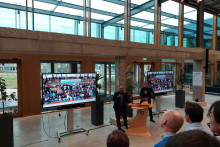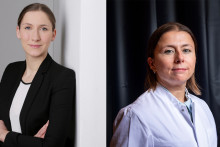A Dutch-language track for all major English-taught bachelor's programmes. What does this mean for UT programmes?
'That depends on several factors, but the fact is that we don't have very large programmes at the UT, and that also applies to the other technical universities. When you think of large bachelor's programmes, you have to think of a law or economics programme, in which thousands of students enter every year. Moreover, this is a proposal, which does not mean that the ministry and the House of Representatives will adopt it.'
There is also talk of programmes switching completely back to Dutch. Does that also apply to the UT?
'No, I can't think of a programme where that will pay off. Psychology is often cited as an example, because many German students come here to study. The only thing that is forgotten is that we used to offer psychology in Dutch, but German students also came here back then. In that case, a change in language has little impact on the influx. However you offer a bachelor's degree, for example with a Dutch part in the track, you must be ready for a master's at an academic English level. So you can't avoid English playing a part in a bachelor's programme.'
TWENTE PATHWAY COLLEGE DISAPPEARS
The proposal also states that universities that offer a preparatory year to students will stop doing so. Since 2019, the UT has been offering this programme together with Twente Pathway College. During a transition year, pre-Bachelor's students – mainly from outside the EEA – are offered an educational programme to prepare them for one of the UT Bachelor's programmes. The contract was due to expire 31 August 2024, but was recently extended with two years to 2026.
All universities have their own ideas and problems. How did this shared proposal come about?
'We try to do justice to the differences between universities. Don't underestimate the current impact of the recruitment freeze for international students. This measure is intended to combat problems related to housing. We have fewer registrations here, but no effect is yet seen in the Randstad. While the problem is mainly there.
The measures should not result in fewer international students, but better accessibility for Dutch students. However, it is not the case that we, as the Executive Board, determine the language policy for each programme, there is a programme committee for that. And the House of Representatives has just agreed – to my satisfaction, to a stronger participation. They also have something to say about this.'
The universities themselves are taking the lead in solving the problems. Is that a tactical choice, in order to stay ahead of politics?
'The minister has appealed to higher education to take control. Moreover, we don't look away from problems. Two-thirds of the House of Representatives want to reduce the number of English-taught programmes. We want to do something, but realistically and at our own pace. I notice that MPs sometimes think that we can make huge changes within one year. Teaching both students and staff the Dutch language or offering Dutch tracks: that is a process that takes years. That is why we are making this proposal now. There is no doubt that things are going to change, also at the UT. But it has to be feasible.'
What will change for master's programmes?
'There are parties that also want to reduce English in master's programmes, but this proposal only concerns bachelor's programmes. We don't want to touch the master's programmes. What's more, this is not even possible for many master's programmes, because material, study material or data is not available in Dutch.'
You are also considering the introduction of a placement policy: if one university does not have a place, then the other may do. Is the UT in favour of this?
‘That is what we support. However, this is more about a different way of financing higher education. With a placement policy, you create a fixed capacity and therefore also stable financing. That works much better than a peak one year and a drop in the influx the next. After all, we don't earn money from students, I read that misunderstanding regularly. As institutions, we agree on a new funding model, but the ministry thinks otherwise.'
What will be the next steps?
'As the Executive Board, we are going to talk to the faculties and the participation bodies. We were already having informal conversations, but we are now going to make more concrete plans. We also have to wait for the answer from the minister and the House. In addition, we are already trying to think ahead. If, in the long run, we have to offer Dutch lessons on a large scale or partly Dutchify tracks, that will create an enormous amount of work. That's something we need to think about as a university.'






